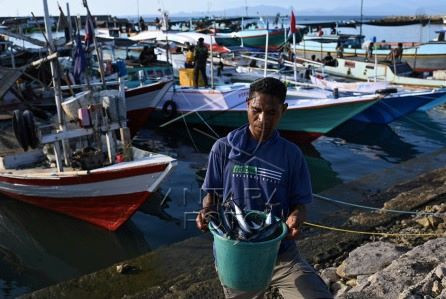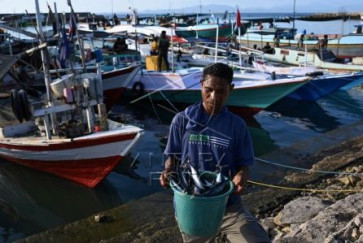Popular Reads
Top Results
Can't find what you're looking for?
View all search resultsPopular Reads
Top Results
Can't find what you're looking for?
View all search resultsRobust protection for small-scale fishermen in subsidies agreement
Global subsidies for fishing have proven to be a major cause of overfishing and overcapacity (OFOC) in global fisheries.
Change text size
Gift Premium Articles
to Anyone
 Small contribution: A fisherman carries the catch he will sell at an auction center in Oeba Port in Kupang, East Nusa Tenggara, on June 25, 2024. The Maritime Affairs and Fisheries Ministry has set the national fish production target at 30.85 million tonnes this year, up from 24.74 million tonnes last year. (Antara/Aditya Pradana Putra)
Small contribution: A fisherman carries the catch he will sell at an auction center in Oeba Port in Kupang, East Nusa Tenggara, on June 25, 2024. The Maritime Affairs and Fisheries Ministry has set the national fish production target at 30.85 million tonnes this year, up from 24.74 million tonnes last year. (Antara/Aditya Pradana Putra)
N
egotiations on fisheries subsidies are so complicated that for more than 21 years, World Trade Organization (WTO) member countries have been unable to reach a deal, except for the first wave of the adopted Fisheries Subsidies Agreement in 2022.
It was no different at the 13th WTO Ministerial Conference in Abu Dhabi earlier this year, which ended without an agreement even after talks were extended until the morning of March 2.
The issue of fisheries subsidies is becoming a major issue at the WTO as pressure mounts on the organization to regulate the provision of global subsidies for fishing, which has proven to be a major problem causing overfishing and overcapacity (OFOC) in global fisheries.
Data show that large subsidizers should be held more accountable to reduce their subsidies so that fish stocks are not further depleted. According to Rashid Sumaila et al, fisheries subsidies were estimated at US$35.4 billion in 2018.
The five largest countries and groupings provide subsidies amounting to 58 percent ($20.5 billion) of the total subsidies, namely China (21 percent), the European Union (11 percent), the United States (10 percent), South Korea (9 percent) and Japan.
The WTO's mandate to discuss fisheries subsidies began when the United Nations adopted Goal 14.6 of the Sustainable Development Goals (SDGs) in 2015 to prohibit certain forms of fisheries subsidies that contribute to OFOC, to eliminate subsidies that contribute to illegal, unreported and unregulated (IUUF) fishing, to refrain from new subsidies and to recognize special and differential treatment (SNDT) as an integral part of the WTO Agreement on Fisheries Subsidies.
In the course of negotiations, member countries in Abu Dhabi considered the SNDT as an important component of fisheries subsidy arrangements in accordance with the mandate of SDG 14.6. However, developed countries are generally reluctant to provide an effective SNDT because they believe that there are loopholes that would prevent the effective regulations to fulfill the mandate of SDG 14.


















